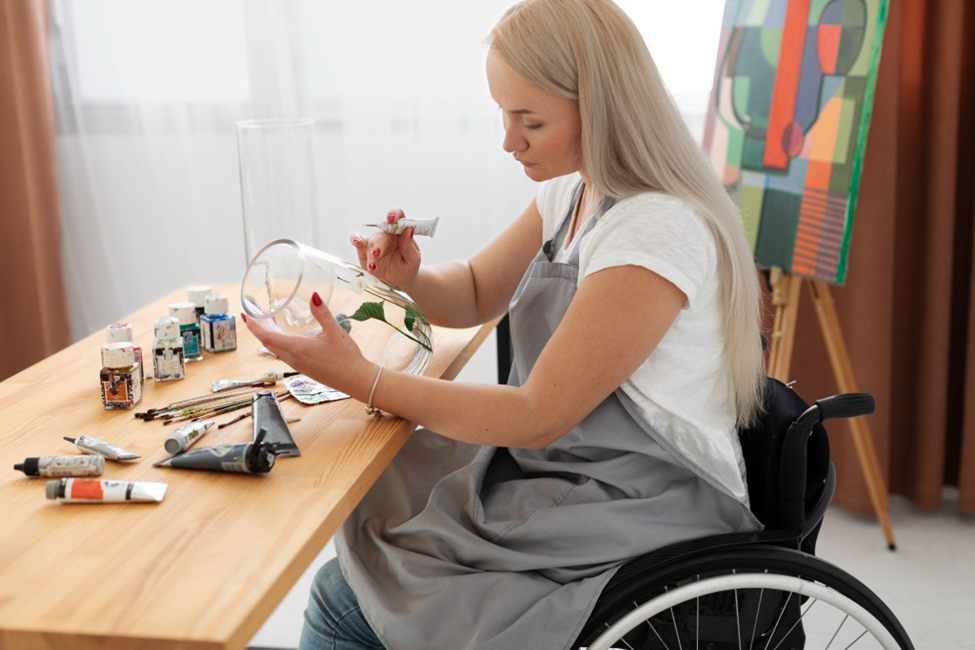Creative Hobbies and Activities for Individuals with Disabilities
Engaging in creative hobbies is more than just an enjoyable pastime; it’s a way to enhance emotional well-being, boost cognitive abilities, and promote autonomy. For individuals with disabilities, these activities can be tailored to meet specific needs, ensuring inclusivity. By fostering social connections and building community, creative hobbies contribute to improved daily living and holistic personal growth. Explore some adaptive and inclusive hobbies below.
1. Art and Craft: Unleash Your Inner Artist
Artistic representation is one way of expressing one’s thoughts and emotions. Activities such as painting, drawing, or sculpting are versatile and can make art easily accessible to people with all kinds of abilities. For example:
- Adaptive tools: Use grip-friendly brushes or textured paper for ease of use.
- Techniques: Finger painting or sponge painting can accommodate those with limited fine motor skills.
Workshops of art for the disabled are offered in the market and provide an opportunity for the disabled to create and socialize in a safe and positive atmosphere.
2. Gardening: Cultivating Joy and Responsibility
Gardening is an enjoyable hobby that brings an individual nearer to nature and can be adjusted by looking at movement requirement needs such as:
- Raised garden beds for easier access.
- Adaptive tools like lightweight trowels or ergonomic grips.
Creating a garden, regardless of the gardening objectives – whether planting flowers, herbs, or even vegetables – gives one a sense of effort and achievement. In this sense, it’s satisfying to watch things grow, which helps to minimize stress and increase focus.
3. DIY Projects: Create Something Unique
DIY, also known as do-it-yourself, is said to be ideal for people who would want to get actively engaged in such activities. Variety comprises building small houses for birds and making furniture or artwork. Such projects can be combined in scales according to an individual’s capability. Here’s how to make them more accessible:
- Pre-cut kits: Use ready-to-assemble kits for woodworking or model-making projects.
- Simplified tools: Adaptive tools like easy-grip scissors or lightweight hammers ensure safety and comfort.
DIY projects provide a sense of achievement as participants see their creations come to life.
4. Cooking and Baking: A Delicious Creative Outlet
Cooking and baking are not only enjoyable but also teach valuable life skills. These activities can be made accessible with the following.
- Adapted kitchen tools, such as one-handed cutting boards or easy-grip utensils.
- Visual or talking instructions to simplify recipes.
The participants can also explore cake decoration or recipe creation which means the kitchen can be used as a creative space. Not to mention the outcomes are both enjoyable and tasty too!
5. Digital Art and Photography: Creativity Meets Technology
There is an unprecedented way in which people practice arts and crafts with advancements in technology. Digital art and photography are two hobbies that illustrate this best, how there are no limits to creativity:
- Digital art tools: Use accessible software like drawing tablets with stylus pens or touch-friendly apps.
- Photography: Adaptive cameras or smartphone apps with voice guidance allow individuals with mobility or sensory challenges to capture stunning images.
Both activities encourage exploration, experimentation, and artistic expression in the digital age.
6. Board Games and Puzzles: Fun for the Mind
Board games and puzzles are excellent for social interaction and mental stimulation. Many games are available in accessible formats, such as:
- Large-print or braille puzzles for those with visual impairments.
- Custom-designed board games to accommodate different motor abilities.
These activities are not only enjoyable but also help develop problem-solving skills and promote teamwork.
Conclusion
Creative hobbies provide individuals with disabilities the opportunity to explore their passions, enhance skills, and build confidence. From gardening to DIY projects, these activities are designed to be inclusive and adaptive, ensuring everyone can participate and benefit.
We’re committed to supporting individuals in discovering hobbies that bring joy and fulfillment. Explore our range of services for NDIS-supported programs to find an activity that sparks your creativity.



